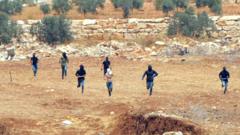The ongoing conflict between Rwanda and the Democratic Republic of Congo may soon see relief as officials from both nations have reached a draft peace agreement, focusing on disarmament and security. Mediated by the US and Qatar, this potential deal could pave the way for significant foreign investment in the mineral-rich region but raises questions about its sustainability.
Rwanda and DR Congo Move Closer to Peace with Draft Agreement

Rwanda and DR Congo Move Closer to Peace with Draft Agreement
A draft peace deal between Rwanda and the Democratic Republic of Congo has been developed to end decades of conflict, with hopes for a formal signing next week.
Representatives from Rwanda and the Democratic Republic of Congo (DR Congo) have announced the completion of a draft peace agreement, which aims to resolve decades-long conflict between the two countries. The deal, mediated by the United States and Qatar, includes provisions for the disengagement, disarmament, and conditional integration of armed groups operating in eastern DR Congo. Additionally, it proposes a joint security mechanism to help prevent future hostilities.
This significant breakthrough may lead to a formal signing ceremony next week, potentially resulting in billions of dollars of western investment in the tumultuous, mineral-rich region, which has suffered from conflict for nearly three decades. However, analysts express concerns regarding the uncertainties surrounding the peace agreement's implementability.
The US State Department reported that technical teams from both nations initialed the draft text on Wednesday, setting the stage for an official signing event expected to be attended by US Secretary of State Marco Rubio. This agreement may build upon previous understandings outlined in an earlier accord signed in April, where both nations pledged to respect sovereignty and work toward a draft peace deal in the days that followed.
The conflict recently escalated when M23 rebels—believed to be backed by Rwanda—gained control of significant mineral-rich territories in eastern DR Congo. While Rwanda denies any involvement with M23, declaring its military presence is a defensive response to threats posed by groups like the FDLR, the situation escalated with M23 seizing cities such as Goma and Bukavu, establishing governing structures in the territories they occupy. Tragically, thousands have lost their lives, and hundreds of thousands of civilians have been displaced amid the rebel offensive.
Following these territorial losses, the DR Congo government sought assistance from the US, reportedly offering access to vital minerals found in the region, including coltan—essential for the global electronics industry. History shows that previous peace deals have faltered; last year, Rwandan and Congolese experts reached two agreements on troop withdrawals and joint operations against the FDLR under Angolan mediation, only for them to remain unendorsed by key ministers. Consequently, Angola stepped back as a mediator earlier in March.
As discussions continue, the safety and stability of the region remain fragile, and the stakes are high for both nations and their citizens.






















